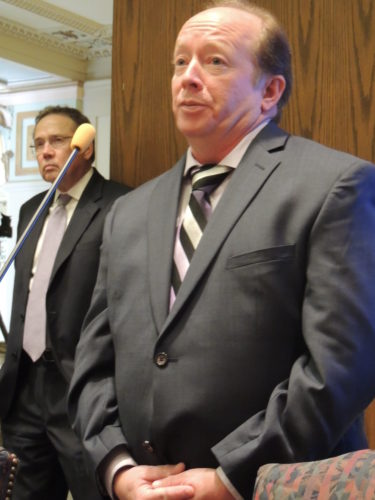A set of best practices could limit innocent people in Oklahoma going to prison for crimes they did not commit. That’s according to the testimony heard during the Senate Judiciary Committee’s interim study examining eyewitness misidentification.
In recent years, DNA has exonerated several people across the country including here in Oklahoma. Many cases show that eyewitness testimony was incorrect.
“One of the worst things government can do is to unjustly take away a person’s liberty,” said Senator David Holt. “We heard from two men who were wrongfully convicted and sent to prison because of the way investigators worked with the victims to identify a suspect. Those identifications were later proven wrong through DNA evidence, though the damage done to those innocent men cannot be undone. But going forward, there are methods that can reduce eyewitness misidentification.”
Holt requested the interim study. The hearing featured Oklahoma Innocence Project Executive Director Vicki Behenna. She outlined four key best practices which would increase the reliability of witness identification.
 Tim Durham of Tulsa was facing a sentence of more than 3,000 years for the rape of an 11-year-old girl when she identified him as the suspect. He spent several years in prison until DNA proved he could not have been the attacker. He related his story to the committee.
Tim Durham of Tulsa was facing a sentence of more than 3,000 years for the rape of an 11-year-old girl when she identified him as the suspect. He spent several years in prison until DNA proved he could not have been the attacker. He related his story to the committee.
“The victim in this case said her attacker had a pock-marked face…and a pot belly. My arrest record shows that at the time, and my photographs show that I had no pock-marked face. I actually had a full beard and mustache 14 days after the crime which I could not have grown in that time,” Durham said. “If these best practices had been in place, I believe that it would have been difficult for the victim in this case to even make that identification.”
Behenna noted that the guilty party usually remains at large to commit more crimes in the cases of a misidentification. In the end, it costs taxpayers millions.
“You can’t put in dollar amount the loss of life that an exoneree feels in being convicted for a crime which they did not commit. By way of dollar amounts, the state of Oklahoma has already paid out $1.36 million to six exonerees,” Behenna said.
She said that doesn’t include the millions in civil lawsuits.
The Oklahoma Innocence Project is offering free materials to help police departments adopt the best practices. Oklahoma City has already put the steps into place.
Holt said legislation could be one way of ensuring the identification best practices become more widely used by law enforcement, but he would rather see the agencies begin moving in that direction on their own.
“We’d like to see CLEET (Council on Law Enforcement and Training) help get this into their training with a goal of having all law enforcement agencies voluntarily adopt these best practices, but we’ll of course be monitoring this to see how it progresses,” he said.


